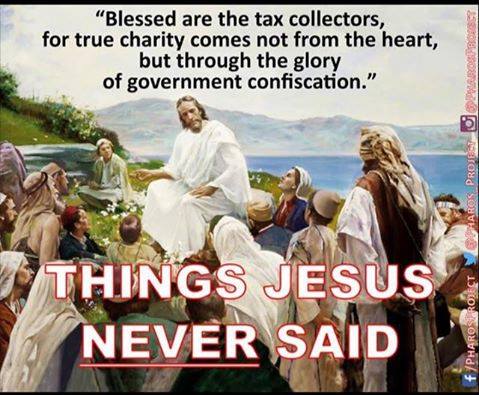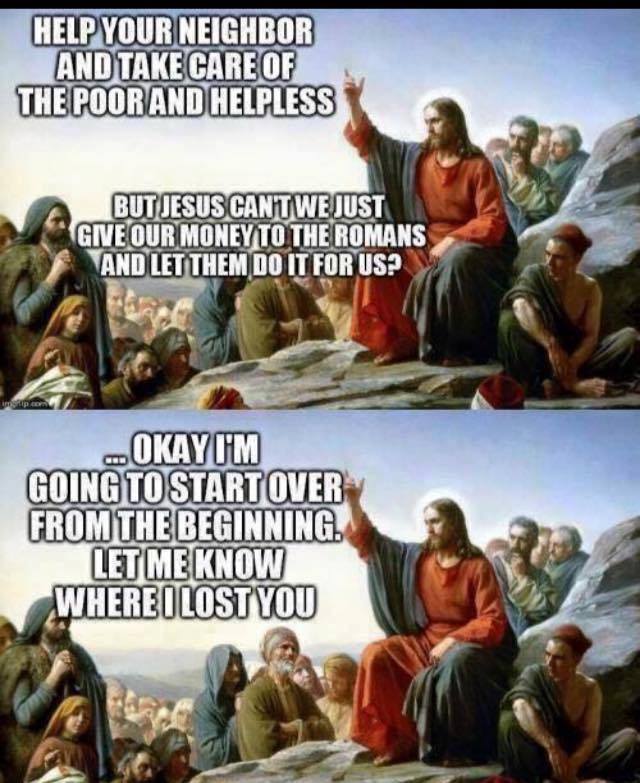There is no virtue in compulsory government charity, and there is no virtue in advocating it. A politician who portrays himself as “caring” and “sensitive” because he wants to expand the government’s charitable programs is merely saying that he’s willing to try to do good with other people’s money. Well, who isn’t? And a voter who takes pride in supporting such programs is telling us that he’ll do good with his own money – if a gun is held to his head.” ~P.J. O’Rourke
As C.S. Lewis put it, “We make men without chests and expect of them virtue and enterprise. We laugh at honour and are shocked to find traitors in our midst. We castrate and bid the geldings be fruitful.”
Marv Olasky wisely adds, “Similarly, when the poor are left with neither incentive nor penalty, we are surprised to find them immobile. When many children grow up without knowing a father either on earth or in heaven, we are surprised to find them wilding in the social wilderness.
Who pushes for change once the wilderness is spreading? If the goal is to provide material wealth through welfare or other entitlements, neither government nor the recipient is likely to demand change. Universalizing depersonalizers are popular among the poor who do not want anyone to challenge them. Who will fight such an arrangement? Only those who live by a different ethic and are unwilling to see it die.
The problem with welfare programs isn’t that they are too expensive–although, clearly, much money is wasted–but because they are inevitably too stingy in what it really important, treating people as people and not animals. Isn’t it time we realized that there is only so much that public policy can do? Certainly it’s good to “empower” the poor so they are not in thrall to the welfare establishment, but isn’t it time to realize that only a richness of spirit can battle a poverty of the soul? Can a pluralistic government pinpoint sin and oppose it?
The crisis is not just one of government charity through welfare and other entitlements. Too many private charities dispense aid indiscriminately and thus provide, instead of points of light, alternative shades of darkness. The right question to ask is still the same century-old question: Does any given “scheme of help make great demands on men to give themselves to their brethren?”
We need to ask ourselves: Are we offering not coerced silver but our lives? Most of our twentieth century schemes, based on having someone else take action, are proven failures. It’s time to learn from the warm hearts and hard heads of earlier times, and to bring that understanding into our own lives.”



Beautifully said. More Christians should preach the message of charitable giving vs “charitable theft by proxy”
To those who lament “…but without government, children will starve in the streets! Millions will go hungry and unprotected. We NEED the government because people won’t step up to help without it!”
I say this:
You simply don’t understand poverty. To suggest that there would be no charity to aid the poor unless government did it shows how little you understand about poverty before government tried to solve it.
As Father Fr. James V. Schall, S.J. has eloquently said: “We should not approach the problem of poverty without some idea of why the poor are poor, or how they might cease to be poor. . . . It has long been pointed out that usually a relation exists between envy discussions and poverty discussions. . . . The reason the poor are poor is not because the rich are rich. Indeed, if we have a no growth theory, which lacks the incentives to create riches, we must end up with a “redistributionist” mentality. . . . probably the greatest producers of poverty are government plans to alleviate it. . . If we misunderstand the causes of poverty and fail to understand what causes wealth, we will make everyone poor in the noble name of helping the poor.” ~James V. Schall, S.J.
” Of all the pernicious things that a government does, arguably the worst is when the government gets into the business of charity. That’s the kind that Mr Bunce took exception to. If politicians and bureaucrats want to support charity, they should do that with their own money, not the public’s money. They are free to contribute as much as they wish of their own money, and they should extend that freedom to everybody else. Let people decide how much they want to spend and on which charity.
I can honestly claim that I contribute to charity regularly. Why? Because I am moved by empathy and compassion towards my fellow beings. I not only receive the joy of giving without expectations of return, I also derive psychic satisfaction by exercising the freedom of deciding on whom or what I spend my money. I wish I had more money so that I could give more of it away. A favorite quote from Khalil Gibran’s The Prophet goes, “All you have shall some day be given; Therefore give now, that the season of giving may be yours and not your inheritors.”
When the government takes my tax money to spend on what it considers charity, it deprives me of my freedom to give freely, it deprives me of the joy of giving, and takes away a responsibility from me that I treasure. What is worse, when I forced to do something, I resent it even if that something is something that I would have otherwise voluntarily done.
When the government taxes me to do charity, it is to me morally and functionally equivalent to someone putting a gun to my head and robbing me to help a poor person. Regardless of what the money is going to be used for, robbery is immoral and unethical.”
–https://deeshaa.org/2015/12/25/charity-should-be-voluntary-not-coerced/